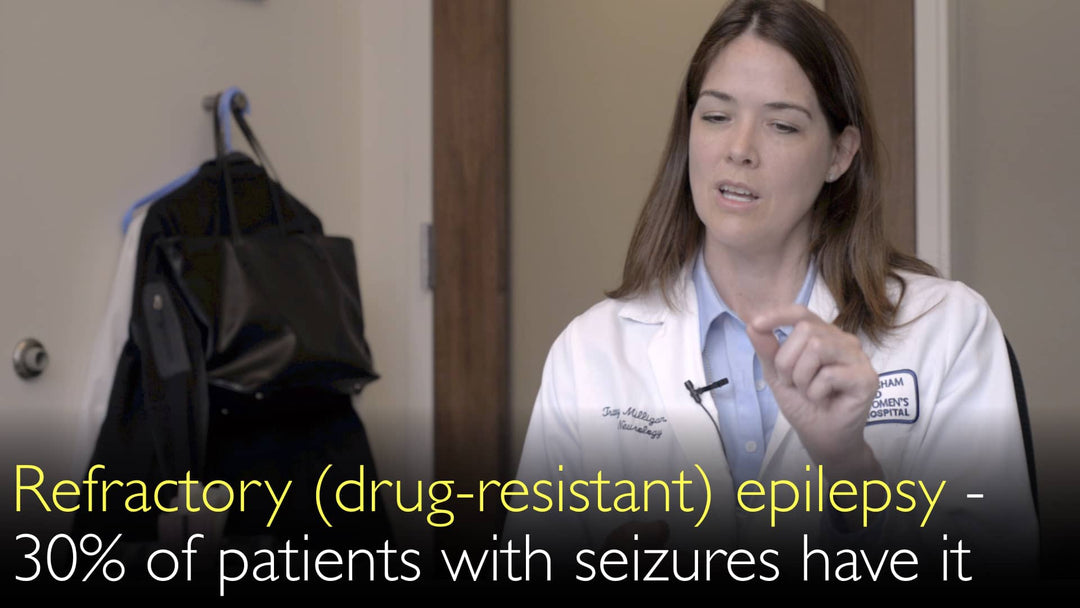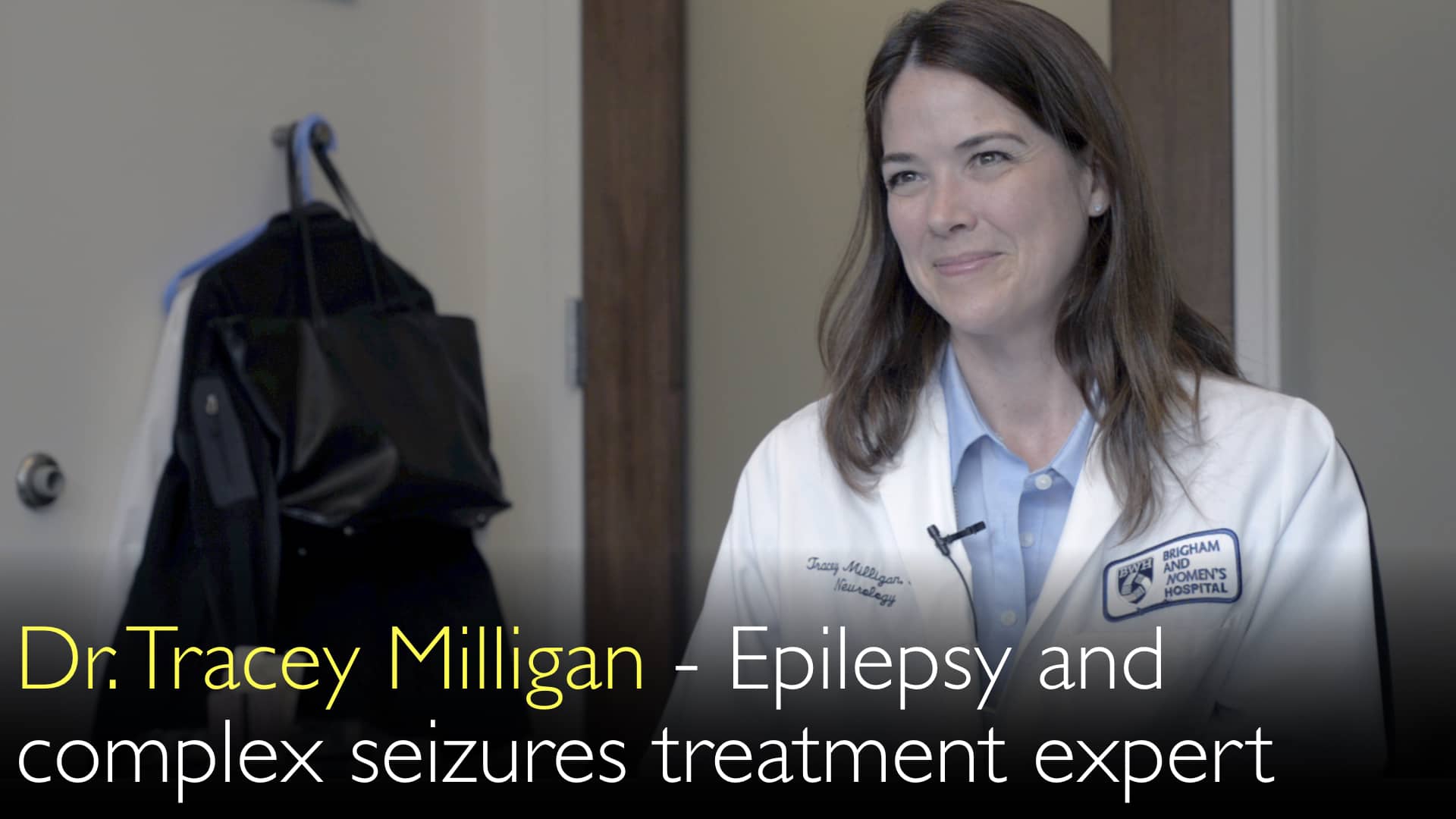מומחית מובילה בטיפול מתקדם באפילפסיה, ד"ר טרייסי מיליגן, MD, מסבירה על אפילפסיה עמידה. היא מפרטת כיצד 30% מהחולים סובלים מהתקפים שאינם מגיבים לטיפול תרופתי. ד"ר טרייסי מיליגן, MD, דנה בקריטריונים האבחוניים לאפילפסיה עמידה לתרופות. היא מדגישה את התפקיד המכריע של בדיקת MRI מוח מתקדמת בזיהוי מטרה ניתוחית. ד"ר מיליגן מתארת כיצד כריתה נוירוכירורגית של מוקד אפילפטי יכולה להוות טיפול מרפא.
אפשרויות טיפול מתקדמות לאפילפסיה עמידה לתרופות
קפיצה לפרק
- מהי אפילפסיה עמידה?
- אבחון אפילפסיה עמידה לתרופות
- תפקיד ה-MRI מוח בהערכה
- אפשרויות טיפול ניתוחיות
- פוטנציאל לריפוי ניתוחי
- תמליל מלא
מהי אפילפסיה עמידה?
אפילפסיה עמידה היא מצב שבו תרופות אנטי-אפילפטיות אינן מצליחות לשלוט בפרכוסים. ד"ר טרייסי מיליגן, MD, מבהיר שתרופות אלו יעילות עבור רוב חולי האפילפסיה. כשני שליש מהמטופלים משיגים חופש מפרכוסים עם טיפול תרופתי מתאים. השליש הנותר של החולים ממשיך לחוות פרכוסים למרות הטיפול. אוכלוסייה ספציפית זו מאובחנת עם אפילפסיה עמידה או עמידה לתרופות.
אבחון אפילפסיה עמידה לתרופות
אבחון פורמלי דורש גישה שיטתית. ד"ר טרייסי מיליגן, MD, מסביר שחייבים לנסות לפחות שתי תרופות אנטי-אפילפטיות שונות. כל תרופה חייבת להינתן במינון טיפולי. המטופל חייב לקחת את התרופה באופן עקבי מדי יום. רק לאחר שמאמץ זה נכשל, מאושר אבחון של אפילפסיה עמידה לתרופות. תהליך זה מבטיח שהחולים יקבלו אבחנה מדויקת לפני בחינת אפשרויות מתקדמות יותר.
תפקיד ה-MRI מוח בהערכה
דימות מתקדם הוא אבן יסוד בבירור אפילפסיה עמידה. ד"ר טרייסי מיליגן, MD, מתאר את השימוש ב-MRI מוח ברזולוציה גבוהה. המטרה היא לזהות ליקוי מבני הגורם לפרכוסים. הרופאים מקווים למצוא נגע גלוי, כגון גידול שפיר כמו מנינגיומה. ממצא נפוץ נוסף הוא מום כלי דם, כגון אנגיומה מערתית. זיהוי מוקד אפילפטי ברור ב-MRI הוא צעד חיובי. זה מספק מטרה פוטנציאלית להתערבות ניתוחית מרפאת.
אפשרויות טיפול ניתוחיות
נוירוכירורגיה מציעה מסלול טיפול חזק למועמדים מתאימים. ד"ר טרייסי מיליגן, MD, מדגיש את תפקיד מרכזי האפילפסיה המתקדמים. מרכזים מומחים אלה מעריכים חולים שתרופותיהם נכשלו. המטרה הניתוחית העיקרית היא הסרה מלאה של מוקד הפרכוס האפילפטי. הליך זה דורש תכנון ומיפוי מדויקים לפני הניתוח. המומחיות הנמצאת במרכז אפילפסיה מקיף היא קריטית להשגת תוצאה מוצלחת. ד"ר אנטון טיטוב, MD, דן במקרים מורכבים אלה עם מומחים כמו ד"ר מיליגן כדי להבין את הטכניקות העדכניות.
פוטנציאל לריפוי ניתוחי
המטרה הסופית של ניתוח אפילפסיה היא ריפוי מלא. ד"ר טרייסי מיליגן, MD, מאשר כי כריתה יכולה להיות טיפול יעיל להפליא. כאשר המוקד האפילפטוגני מוסר בבטחה, חולים עשויים never to have another seizure. תוצאה זו מייצגת שינוי חיים עבור אנשים עם אפילפסיה עמידה לתרופות. זה משחרר אותם מהנטל של פרכוסים בלתי נשלטים ותרופות יומיות. ד"ר אנטון טיטוב, MD, מציין שתוצאה transformativa זו ניתנת להשגה במספר משמעותי של מקרים. זה מציע תקווה immense לחולים המתמודדים עם אבחנה של אפילפסיה עמידה.
תמליל מלא
ד"ר אנטון טיטוב, MD: אתה מומחה בטיפול מתקדם באפילפסיה. מהי אפילפסיה עמידה? מהה החידושים האחרונים בטיפול באפילפסיה עמידה?
ד"ר טרייסי מיליגן, MD: כן. אפילפסיה עמידה היא כאשר תרופות אנטי-אפילפטיות לא עובדות. תרופות אנטי-אפילפטיות עובדות עבור רוב המכריע של חולי האפילפסיה. הן מצליחות לשלוט בפרכוסים האפילפטיים. אלו שני שליש מהחולים.
חולה עשוי להיות עם אפילפסיה, ואתה לעולם לא תדע זאת כי הם לוקחים תרופת אפילפסיה every day. הם לא חווים פרכוסים אפילפטיים. זה משאיר שליש מהאוכלוסייה עם אפילפסיה.
אבל בשליש האחר של חולי האפילפסיה, תרופות אנטי-אפילפטיות לא עובדות. כאשר תרופות אנטי-אפילפטיות לא עובדות, then we call that refractory epilepsy.
We have to try two anti-epileptic medications. We have given our best effort to each epilepsy medication to work. The patient has taken a medication every day. The patient has been able to take a therapeutic dose of medication.
Despite all efforts, if two anti-epileptic medications haven't worked, then it is a refractory epilepsy. Another term for refractory epilepsy would be drug-resistant epilepsy. It means the same thing.
ד"ר אנטון טיטוב, MD: What can be done for patients with refractory epilepsy? How to treat refractory epilepsy successfully?
ד"ר טרייסי מיליגן, MD: A patient may have a drug-resistant epilepsy. We then hope that the epilepsy is due to a specific lesion in the brain. It is a little bit ironic because when anti-epileptic medications don't work in a patient, we perform a brain MRI.
We hope that their brain MRI is abnormal. We hope that a picture of the brain on MRI will show us maybe a little tumor. We hope it is a benign tumor like a meningioma.
Or we hope to see a little vascular malformation, like a cavernous angioma malformation. There is something that we can see on the MRI. That is a likely source of the epileptic seizures.
Neurosurgical operation could be curative in such situation if the epilepsy-generating focus can be safely removed with surgery. They may never have another epileptic seizure again. Those are wonderful things.
We may be able to help patients at an advanced epilepsy center like the one we have here. We can help patients when anti-epileptic medications do not work at all.
We can use a neurosurgical technique to remove the epileptic seizure focus. This will hopefully allow patients to be epileptic seizure-free. It can perhaps cure patients of epilepsy.
ד"ר אנטון טיטוב, MD: That would be a wonderful result certainly! It happens in many cases.





